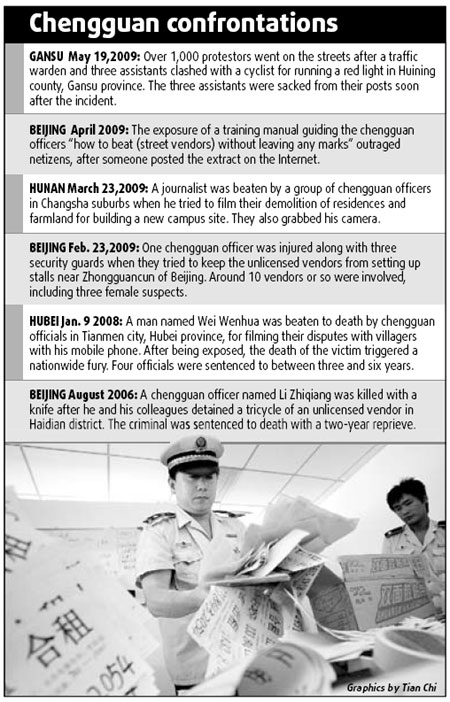Hackers who posted "provocative" and "insulting" headlines on the website of?Shanghai urban management officers, known as chengguan, are being hailed by netizens.
 "Thumbs up to the hackers! Everyone knows how brutal chengguan are in treating street peddlers, who are vulnerable and possibly without jobs," said netizen ff8830 at club.pchome.net.
"Thumbs up to the hackers! Everyone knows how brutal chengguan are in treating street peddlers, who are vulnerable and possibly without jobs," said netizen ff8830 at club.pchome.net.
Another netizen, kene11, even created a dictionary entry for chengguan as synonymous with gangsters, who "use violence and bully the vulnerable."
The attack, which hit the official website of a local chengguan team in Jiangsu province on Friday, changed headlines on the site to read "Chengguan attack street vendors" and "Chengguan visit hair dressing salons", along with a picture of a man hugging two ladies, his shirt half-unbuttoned.
The website was still not accessible by last night.
It was the latest public protest against chengguan - a term that has almost become synonymous with violence in China following years of confrontations between street peddlers and urban management officers.
The motive of the attack was still not clear, according to a spokeswoman from Changzhou Chengguan, who described the incident as "provocative" and "immoral". But she did not think it had anything to do with the actions of her team.
Such claims, however, did little to appease netizens, who actually hailed the attack as being "righteous."
Many also referred to previous confrontations between chengguan and street vendors and called for actions to stop that.
In two separate incidents in April this year, street peddlers in Shenzhen, Guangdong province, attacked chengguan after their stalls were removed from city streets. In one of the incidents, a food vendor stabbed an officer to death.
Earlier in 2007, sausage seller Cui Yingjie from Hebei province was sentenced to death with a reprieve of two years for killing a chengguan in Beijing when the officer tried to confiscate his stall.
Escalated tensions like that have given rise to heated discussions over the legitimacy of the chengguan system in cleansing the city street of "unlicensed peddlers" for the sake of "better environment and hygiene".
China started establishing urban management departments in cities in 1996, and officially put them in operation in 2002.
The intention then was to set up "a comprehensive department for administrative enforcements", which would be responsible for maintaining the city's appearance, environment, hygiene and traffic.
But that does not mean chengguan could abuse their power and violate basic human rights by depriving street peddlers of their basic livelihood, said Cai Dingjian from China University of Political Science and Law.
"No one is authorized to use violence in China except soldiers and police. By resorting to violence, chengguan have actually violated the law," he said.
He also said the problem lies with the irrationality of the chengguan system and the government's mentality behind that, which in the name of maintaining public security should not violate people's right to survive.
"What's wrong with all those street vendors? They are just poor people who need a living, and they are actually a convenience to most of us selling products at a much lower price. As long as they do not threaten public security, the government should really protect their interests instead of depriving them of their means to survive," he said.
Cai also suggested replacing the current chengguan system with a new urban service body that will be responsible for registering street peddlers, so that these self-employed people will become part of the city's business community.
Zhang Tao, a lawyer from a Shanghai-based law firm, also said chengguan and the police alike should exercise greater care when dealing with disputes with street vendors, especially those migrant people.
"They are usually marginalized, may feel lonely, and may be prone to violence once they are treated brutally, so more attention should be paid to their special interests," he said.
(China Daily June 2, 2009)